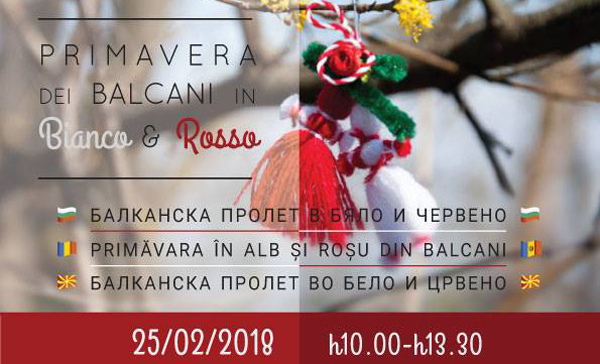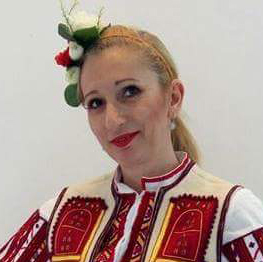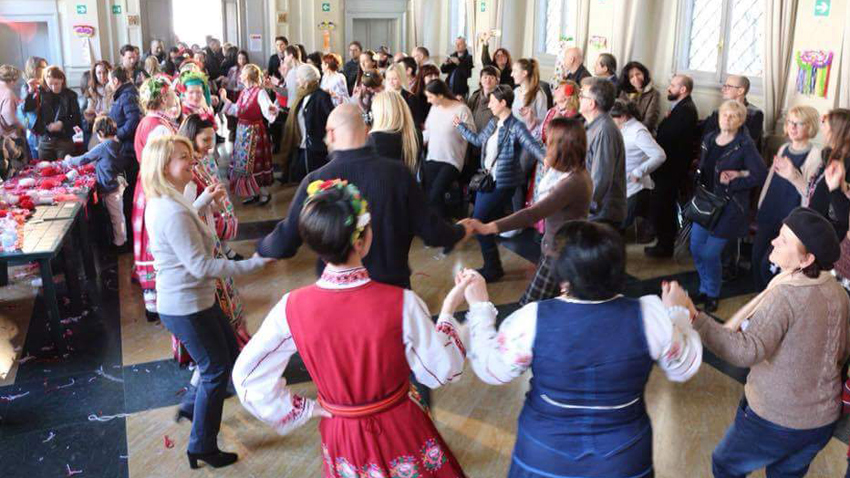 On February 25th the Milan Museum of Cultures (MUDEC) will host the Bulgarian Spring in White and Red event. The holiday was first celebrated 5 years ago as a laboratory for creation of Martenitsas (traditional Bulgarian decoration of white and red threads, gifted on March 1st in honor of the upcoming spring). It was an idea of the Bulgarian school in the Italian city and has been expanding its range through the years. The Bulgarian Association for Cultural Exchange in Milan joined the organization of the fest last year and three other nationalities have been attracted for the current edition – Romanians, Moldavians and Macedonians.
On February 25th the Milan Museum of Cultures (MUDEC) will host the Bulgarian Spring in White and Red event. The holiday was first celebrated 5 years ago as a laboratory for creation of Martenitsas (traditional Bulgarian decoration of white and red threads, gifted on March 1st in honor of the upcoming spring). It was an idea of the Bulgarian school in the Italian city and has been expanding its range through the years. The Bulgarian Association for Cultural Exchange in Milan joined the organization of the fest last year and three other nationalities have been attracted for the current edition – Romanians, Moldavians and Macedonians.
“The Balkan spring represents the will of these four nationalities to display that old tradition at the multinational center in Milan,” Chair of the Bulgarian Association for Cultural Exchange Ana Sotiorva explained for RB and added:
 “The idea is not only about the exhibition, but to teach our children to create Martenitsas. One can easily buy a Martenitsa everywhere in Bulgaria these days, but in Italy you basically have to make one yourself. Tradition also says that you have to create on your own that gift for friends and relatives.”
“The idea is not only about the exhibition, but to teach our children to create Martenitsas. One can easily buy a Martenitsa everywhere in Bulgaria these days, but in Italy you basically have to make one yourself. Tradition also says that you have to create on your own that gift for friends and relatives.”
“Our event? We simply put tables full of white and red threads and show any method that we know of how to make a Martenitsa. Many of our Italian friends joined the process last year. We explained the symbolism of these red and white good-wish tassels. Now the subject is definitely better known here, as the range of wannabe participants has expanded. The Milan Municipality has granted us a hall at MUDEC for the so-called laboratory and exhibition of Martenitsas. This support is significant for the whole organization, since the museum never grants halls, and for free at that, to initiatives that are of no such local significance for the city of Milan. Hence my words that this is great recognition for the Balkan Spring initiative.”

The Bulgarian Association for Cultural Exchange was established in Milan in November 2016, mostly by the members of the Ritmika folklore band. “We try to preserve and pass on to the next generation our folklore – songs, dances and music. We work within tight cooperation with the Bulgarian School, as the future of Bulgaria is concentrated there after all. Being born and raised in Italy, those children have remained a bit distant in regard to their Bulgarian origin,” Ana Sotirova says.
The association is part of other events, related to the popularization of Bulgaria among the Italian public, such as participation in a TV show, dedicated to March 3rd – Bulgaria’s national holiday. “Our basic obstacle is the fact that we are in charge of our own funding,” Ana Sotirova says. “As of October we’ve had those two children’s groups and we have received some support for them by the Bulgarian ministry of education under the Language and Culture Abroad Program.”
“Statistics says that there are around 12,000 Bulgarians in the Lombardy region. The ones in Milan in particular are somehow hard to be taken out of their shell, but things have been gradually changing through the years. There is another organization in Milan involved in Bulgarian dances, songs and language courses like us. These are a total of three organizations which are very active with the support of the Consulate General and the Bulgarian Church, which is also quite distinguishable in its actions here.”

Ana Sotirova comments on the forthcoming March 3rd:
“This year we organize a festive dinner with an evening show – after all, we celebrate 140 years of the Liberation from Ottoman rule; and we shouldn’t also forget about the Bulgarian Presidency of the Council of the EU. There is this initiative committee in Ispra to the north which has been organizing a series of events, related to the Bulgarian Presidency, otherwise poorly covered and commented in Italy. There are lots of events within these 6 months that present Bulgaria – cuisine, music, history… They have invited us to participate in a final festive dinner on June 15th and we will present songs and dances from Bulgaria there,” Ana Sotirova says in conclusion.
English version: Zhivko Stanchev
Who said Bulgarians were grumpy pessimists? Take a stroll through Sofia's Christmas bazaars and meet the cheerful crowd. The festive decorations, music, merry-go-rounds and stalls overflowing with treats and handmade souvenirs can make the gloomiest..
Bulgarian studies are highly valued at the Bogdan Khmelnitsky State Pedagogical University in the Ukrainian city of Melitopol. So it comes as no surprise that the university is hosting the latest edition of the International Bulgarian Studies Readings,..
"You say you are Bulgarian, but you do not know Bulgarian" – this reproach from officials in Bulgaria has been faced by quite a few by our compatriots from the historical Bulgarian communities around the world. One of them is Bledar Alterziu from..

+359 2 9336 661
